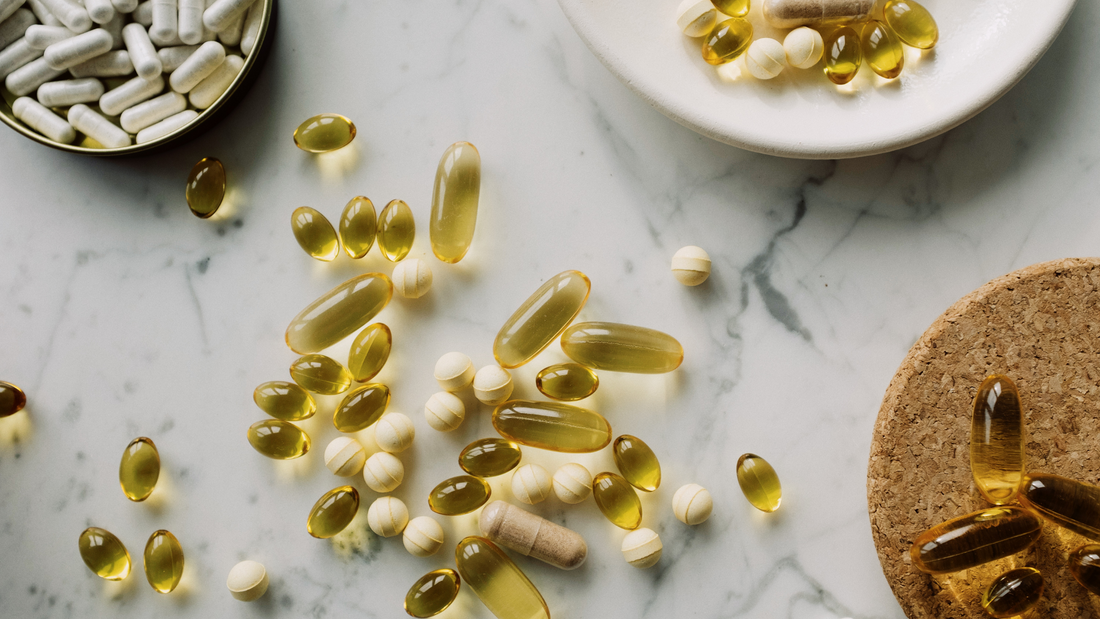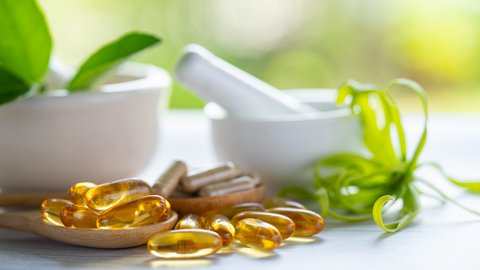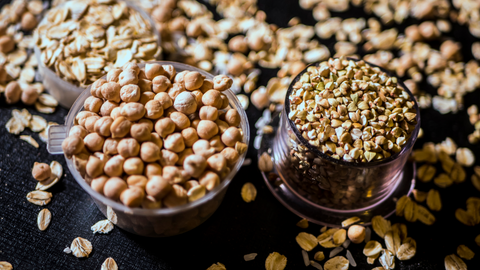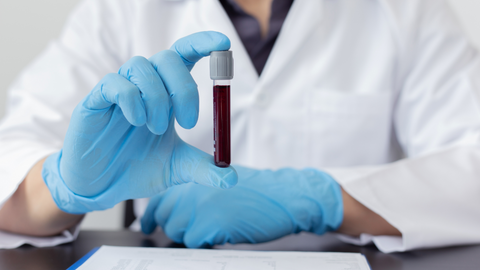Do Plant-Based Eaters Need Supplements?

We live in a world in which eating food high in cholesterol, saturated fat, sodium, processed sugars, and refined carbohydrates is the norm; however, as soon as someone switches to a plant-based lifestyle, friends and family may set off alarms because they are afraid that their loved one will be lacking essential nutrients.
Is there any truth that plant-based eaters are nutritionally deficient as compared to their omnivorous counterparts? The answer is not as simple as “yes” or “no.” You can eat an omnivorous diet in a relatively healthy way, and you can eat plant-based and still be unhealthy. Education, discipline, and common sense are essential for healthy eating regardless of your culinary style.
DO PLANT-BASED EATERS NEED SUPPLEMENTS?
A better question may be, “Does EVERYONE need supplements?”
There are a few nutrients in which plant-based eaters tend to have a higher percentage of deficiencies as compared to their omnivorous counterparts. To be certain, however, many who eat animal products are deficient in these nutrients as well.
Let’s examine a few key nutrients that plant-based eaters may need to supplement if they are not intentional about selecting foods with these nutrients.
Vitamin B-12

The most common argument against the plant-based lifestyle is that you can only get vitamin B-12 from animal sources. This is generally true, but this is not evidence that humans are designed to eat meat.
Neither plants nor animals produce vitamin B-12.
Rather, vitamin B-12 is produced by bacteria found in manure-laced soil and unsanitized water. When eating and drinking straight from the earth, our ancient herbivorous ancestors got plenty of vitamin B-12. But modern-day food sanitation practices keep us from getting an abundance of vitamin B-12 from plant sources and water.
Otherwise, we can get B-12 from eating the animals who eat directly from the earth and who drink unsanitized water themselves.
In fact, agricultural animals are often forced to live in their own manure and are sometimes even fed manure. For example, cows are often fed chicken manure. The FDA reports that most meats are contaminated with fecal bacteria. Furthermore, many agricultural animals, herbivores by nature, are given supplemental vitamin B-12 in their feed.
So, you can consume the manure and dirty water, or you can take a supplement. The choice is yours!
Vitamin B-12 deficiency can cause health problems from fatigue and shortness of breath, nerve damage, depression and mental impairment, and even erectile dysfunction.
BUT WHAT ABOUT VITAMIN B-12 ABSORPTION?
Along with food and supplements, vitamin B-12 can be found naturally in the human digestive tract. It is unclear, however, if enough is made and absorbed there.
By age 60, even meat eaters begin experiencing low levels of vitamin B-12.
Known as precocious anemia, this deficiency is caused by atrophic gastritis, a condition that keeps the body from effectively separating vitamin B-12 from the protein sources.
Fortunately, absorbing supplemental vitamin B-12 does not generally decline with age. In fact, research indicates that regardless of age, the bioavailability of vitamin B-12 appears to be better in supplements than in food.
Vitamin D

Commonly called the sunshine vitamin, vitamin D is essential for calcium absorption as well as improving immune function, memory, and depression.
Even 15 minutes a day in the sun with skin exposure can provide significant vitamin D, but many of us don’t even get that on a daily basis, especially in colder climates.
Furthermore, there are not a lot of food sources of vitamin D, and there are even fewer for plant-based eaters. However, worldwide reports show that both plant-based and meat eaters suffer from vitamin D deficiency.
Vitamin D aids calcium absorption. Vitamin D deficiency can lead to osteoporosis, resulting in increased fragility due to the lack of bone density.
Plant-based sources of vitamin D include mushrooms and fortified foods such as plant-based milks and some cereals.
Omega-3 Fatty Acids

Omega-3 fatty acids are deemed essential fatty acids because your body cannot synthesize them. Therefore, you must get them from food.
The essential Omega-3 fatty acids are DHA and EPA.
Common plant-based dietary sources are flax seeds, chia seeds, and walnuts. However, sourcing omega-3 fatty acids from these sources is indirect because they come packaged in the form of ALA.
Our bodies can form DHA and EPA from ALA; however, research indicates that our bodies may not be efficient at doing so. Therefore, it is suggested that plant-based eaters supplement omega-3 fatty acids from algae-based supplements.
Algae is a rich source of DHA and EPA without the toxins found in much of the world’s seafood today.
Omega-3 fatty acids are good for mood and brain health, eye health, reducing inflammation, preventing autoimmune disorders, and may even reduce the risk of certain cancers. Additionally, many processed foods and plant-based oils are high in omega-6 fatty acids. It is essential to maintain a proper ratio of omega-3 and omega-6 fatty acids. Failure to do so can promote certain chronic diseases.
Supplementing omega-3 algae supplements helps promote a proper balance of omega-3 and omega-6 fatty acids.
Vitamin K2

While there are abundant sources of vitamin K1 in plant foods, vitamin K2 is primarily found in animal-based sources – specifically high-fat dairy, egg yolks, and organ meats – as well as fermented food such as sauerkraut. These are all foods in which even omnivores don’t eat very much. Although our bodies do synthesize some vitamin K2, it may not make enough. Vitamin K2 is essential to forming the blood clots needed to prevent excessive bleeding.
Iodine

Iodine is another nutrient that is radically missing from plant-based diets but is generally low in omnivorous diets as well. The only foods with significant amounts of iodine are iodized salt, seafood, seaweed, and dairy products, which get iodine from cleaning solutions used to clean cows and farm equipment. Iodine deficiency can lead to hypothyroidism, promoting weight gain, fatigue, hair loss, sensitivity to the cold, heavy or irregular periods, and memory issues.
Zinc

Red meat, dairy, and eggs are rich sources of zinc, but at what cost to your body? There are plenty of plant-based sources of zinc, such as whole grains, tofu, oats, nuts, seeds, legumes, and sprouted breads and cereals (such as Ezekiel 4:9 products). But for a new plant-based eater who is still learning, supplementing zinc may be a good idea. When you are deficient in zinc, your body cannot effectively produce new cells, causing unhealed wounds and open sores, decreased appetite and weight loss, decreased sense of smell and taste, lack of alertness, and diarrhea.
WHERE DO I FIND THE BEST SUPPLEMENTS FOR MY PLANT-BASED LIFESTYLE?
Listed below are three brands of supplements that can be beneficial for both new and experienced plant-based eaters. I only review supplements that allow for third-party testing for quality and purity.
COMPLEMENT
Contains: Vitamin B12, Vitamin D3, Vitamin K2, DHA/EPA, Zinc, Iodine, Magnesium, Selenium
Branded as a complement to a healthy plant-based diet, Complement supplements pride themselves on giving their customers just what they need while keeping out extra nutrients and fillers that are not necessary for competent plant-based eaters.
HIPPO 7
Contains: Vitamin B12, Vitamin D, DHA/EPA, Zinc, Iodine, Iron, Calcium
In contrast to Complement, Hippo 7 Vegan Complete multivitamin includes iron and a small amount of calcium, but it does not include vitamin K2. There are abundant sources of iron in the plant-based world, but if you are on a meatless diet with poorly-planned plant-based options, you could experience iron deficiency. This may especially be true for women, who need more iron in their diets than men.
FUTURE KIND
I am going to focus on two Future Kind products, the Essential for Vegans, and the Vegan Complete.
The Essential for Vegans is a very basic product, providing only essential vitamin B12 (as methylcobalamin and adenosylcobalamin), vitamin D3, and DHA/EPA. These are the most essential supplemental needs for plant-based eaters.
The Vegan Complete is a quality multivitamin for every eating style, providing a full range of nutrients that are not limited to the ones that are typically deemed essential for those eating plant-based. In contrast to their Essential for Vegans product, the Vegan Complete provides vitamin B12 in the form of cyanocobalamin.
SHOULD I GET A BLOOD TEST BEFORE TAKING THESE SUPPLEMENTS?

If you are switching to a plant-based lifestyle, I would suggest initially getting your blood tested every 6 months, regardless of whether or not you take supplements.
Get a baseline blood test when you first begin your plant-based journey.
It is important to test for your levels of vitamin B12, vitamin D, calcium, omega-3 fatty acids (DHA/EPA), omega-3/omega-6 ratio, and perhaps iron (especially for women).
If you become a plant-based master, and your lab results begin to reveal optimal levels, then talk to your healthcare professional about reducing it to an annual test.
Resources
If your doctor is not supportive of your lifestyle change and is unwilling to support you in ordering the aforementioned blood tests, rest assured that there are many in the medical community who have your back. These groups understand the health benefits of the plant-based lifestyle while being sensitive to the challenges that we face in the medical community and in the broader culture.
- Lifestyle Medicine practitioners promote a whole plant-food eating pattern to prevent and reverse chronic health conditions and to lose or maintain a healthy weight.
- Plant-Based Docs (a subset of the plant-based physician group Plantrician Project) offers medical support for those who are living a plant-based lifestyle.
- Plant-Based Telehealth is a physicians group of board certified Lifestyle Medicine Specialists who work remotely for patients in nearly every state.
- Terra Health Coaching is a group of health coaches trained in Lifestyle Medicine, many of whom are also certified in various clinical specialties. Terra Health offers the opportunity to order an at-home lab kit to take your blood sample and send it in for testing. Your results will be posted to a digital app account assigned to you, and your personal Lifestyle Medicine health coach will discuss your results and support you in transitioning to a predominantly plant-based lifestyle and guide you in pursuing other healthy habits.
The evidence for the health benefits of plant-based living is overwhelming.
However, supplementation may be needed for ALL of us, with some very specific considerations for those who choose the overwhelming benefits of eating predominantly whole plant food.
Vince Tucker is a Lifestyle Medicine Health and Wellness Coach and an active member of The American College of Lifestyle Medicine. Vince is also a Certified Master Vegan Lifestyle Coach and Educator.
